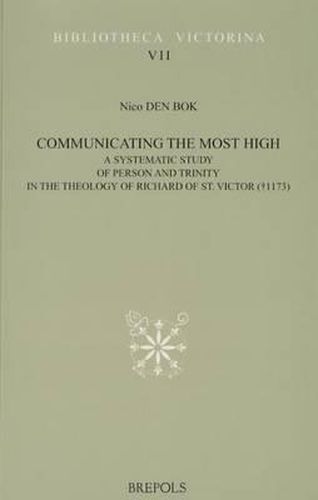Readings Newsletter
Become a Readings Member to make your shopping experience even easier.
Sign in or sign up for free!
You’re not far away from qualifying for FREE standard shipping within Australia
You’ve qualified for FREE standard shipping within Australia
The cart is loading…






De Trinitate is Richard’s opus magnum. Based on meditation of the daily liturgy in St. Victor, where the Quicumque was sung, it is a profound contribution to Trinitarian theology, combining an Augustinian grasp of the oneness of God with an original analysis of ‘God is love, therefore Trinity’. Richard develops his famous new definition of persona designed to fit both tenets and applicable to both God and man. The influential master in spirituality and contemplation proves to be an acute systematic theologian following Anselm’s fides quaerens intellectum, keen to find an understanding of God showing that he must be as Christians believe him to be (rationes necessariae). Den Bok puts this daring project in its Victorine context, as one kind of reflection within an integral restoring and dynamic unfolding of all human faculties and desires in the relationship with God. Communicating the Most High is concentrated on Richard’s analysis of love and person, showing a wealth of detailed considerations that should be taken into account in any Trinitarian theology. It might even seem that he develops a relational concept of person anticipating postmodern Social Trinitarianism. Den Bok shows that Richard’s view has too many indispensable insights against this extrapolation and that, where it seems open for it, it would not be the better systematic position to develop - as was realized by most theologians in the course of the thirteenth century. This volume of the Bibliotheca Victorina may show that Richard’s Trinitarian theology is not only worth studying in its own right, but also elucidating for present day theology. Focused on the concept of person and limited to one major question, the first chapter offers an overview of twentieth century Trinitarian theology, the Epilogue offers a systematic assessment instructed by Richard. Is God the Trinity one perfect person (Barth, Rahner) or a perfect community of persons (Moltmann, Swinburne)? Three aspects involved in personhood are singled out for closer inspection: individuality (of each divine person and of God), will (of each divine person and of God) and relation (between the divine persons and between God and creation). Tracing these aspects in Richard’s dense explorations the reader will be able to discover that we can, and should, learn from the great medieval theologians.
$9.00 standard shipping within Australia
FREE standard shipping within Australia for orders over $100.00
Express & International shipping calculated at checkout
De Trinitate is Richard’s opus magnum. Based on meditation of the daily liturgy in St. Victor, where the Quicumque was sung, it is a profound contribution to Trinitarian theology, combining an Augustinian grasp of the oneness of God with an original analysis of ‘God is love, therefore Trinity’. Richard develops his famous new definition of persona designed to fit both tenets and applicable to both God and man. The influential master in spirituality and contemplation proves to be an acute systematic theologian following Anselm’s fides quaerens intellectum, keen to find an understanding of God showing that he must be as Christians believe him to be (rationes necessariae). Den Bok puts this daring project in its Victorine context, as one kind of reflection within an integral restoring and dynamic unfolding of all human faculties and desires in the relationship with God. Communicating the Most High is concentrated on Richard’s analysis of love and person, showing a wealth of detailed considerations that should be taken into account in any Trinitarian theology. It might even seem that he develops a relational concept of person anticipating postmodern Social Trinitarianism. Den Bok shows that Richard’s view has too many indispensable insights against this extrapolation and that, where it seems open for it, it would not be the better systematic position to develop - as was realized by most theologians in the course of the thirteenth century. This volume of the Bibliotheca Victorina may show that Richard’s Trinitarian theology is not only worth studying in its own right, but also elucidating for present day theology. Focused on the concept of person and limited to one major question, the first chapter offers an overview of twentieth century Trinitarian theology, the Epilogue offers a systematic assessment instructed by Richard. Is God the Trinity one perfect person (Barth, Rahner) or a perfect community of persons (Moltmann, Swinburne)? Three aspects involved in personhood are singled out for closer inspection: individuality (of each divine person and of God), will (of each divine person and of God) and relation (between the divine persons and between God and creation). Tracing these aspects in Richard’s dense explorations the reader will be able to discover that we can, and should, learn from the great medieval theologians.